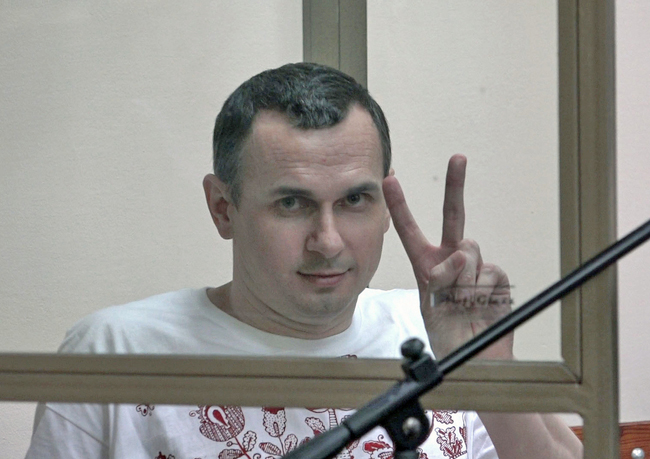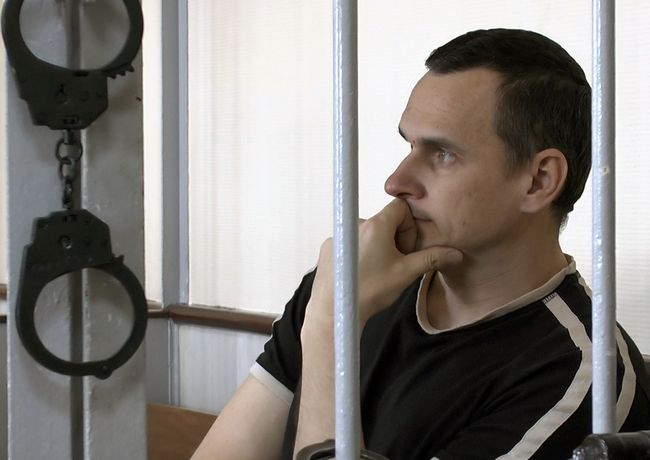“This is an act of intimidation”
Russian Askold Kurov’s film The Trial: The State of Russia vs Oleg Sentsov (Estonia – Poland – the Czech Republic) premieres at Docudays UA
Kurov followed the trial from the very start. The result is a 75-minute-long chronicle of the process, extended with comments by attorneys, political scientists, and Sentsov’s family, as well as news stories and reportage shootings that were not directly linked to the trial. The director processed a vast amount of material and in fact produced a publicist program. It almost completely lacks an inner rhythm, it has no cinematographic history of its own, and some commentators were poorly chosen. Yet the movie fulfils its main goal. It reminds the audience (including the international one) about the crimes committed by Putin’s Russia. A proof can be seen in reviews published by leading movie news outlets Screen and Variety the next day after Kurov’s film premiered at the Berlin Film Festival. The critics from both magazines simultaneously linked the premiere of The Trial to Trump’s interview to the conservative TV channel Fox News, in which the US president was for an umpteenth time trying to whitewash Putin. The journalists emphasized that it would do Trump good to see Kurov’s movie. Thanks to intuition or an epic historical coincidence, Kurov’s film is extremely topical today, against the backdrop of talks of the probable lifting of Western sanctions against Russia. On the other hand, for us the film is important because we have no right to forget Sentsov and other people, imprisoned in the case of “Crimean terrorists.”
We interviewed Askold Kurov after the premiere of The Trial in Kyiv, at the documentary movie festival Docudays UA.
What were your criteria to handpick the material?
“I had several tasks. Firstly, to provide an easy and clear account of that unbelievably complex case with a multitude of actors and circumstances. Even those people who had been following the trial, lost it several time: there was a lot of obscurity in it. Secondly, to share about Oleh and that context in today’s Russia in which the events unfold. The editing took very long, over a year, we saw three editors come and go, and we had several different versions of the movie. I am happy we were able to find a balance, a composition in which all those tasks were fulfilled.”
What goal did you pursue as a filmmaker?
“For myself, this is first of all a film about a choice. We often live under conditions when we do not have to make the kind of choice Oleh and other participants of the case did. It is good when circumstances do not dehumanize people and do not force them to risk their lives or betray. But these things do happen.”

REUTERS photo
Why do you think the Kremlin chose Sentsov as a scapegoat? Or was it a sort of excessive act, since in Crimea Sentsov was actually arrested as a Ukrainian activist, while the cinematographic aspect of his biography was obscure, and then it was too late to play it back?
“I was continually confronted with this question while I was making the movie. There were several successive hypotheses. In the beginning I really thought it might be a mistake, they really detained Oleh as an activist, without expecting to trigger such a response, with protests of international cinematographic community. And when they realized that they had it wrong, they simply could not retreat: this system never retreats.
“Yet later I realized that they knew all too well who Oleh was, because the criminal file contains evidence given by his brother-in-law who first was a colonel in the SBU, later defected to the FSB, so naturally they could get all information on Oleh from that man. Maybe they really did not expect that the case would send such ripples. Or maybe, like one of our experts says, it was done intentionally, as a demonstration (like in Khodorkovsky’s case) of the fact that no amount of money, power, fame, or high social status can protect you. Such an act of intimidation. Indeed, after Sentsov’s case, as far as I know, protests in Crimea seized and many dissenters left the peninsula. And those who stayed, keep silent.”
Is the Kafkaesque allusion in the title intended?
“Yes, of course. Totally conscious. I instantly got a sensation that I found myself inside a novel by Kafka the moment I came to the trial. But it is also a process which an individual, an entire nation undergo. The English word trial means also a test.”
By the way, by accusing anarchist Kolchenko in this case as a member of the Right Sector, Russia even outdid Kafka in absurdity, given the mutual hatred between anarchists and Right Sector members, champions of absolutely opposite ideologies.
“I will tell you even more (this episode is not included in the movie): Oleh’s sister, Natalia Kaplan, even went to Ukraine to ask the Right Sector for a paper proving that Sentsov and Kolchenko are not their members. When the guys at the Right Sector heard that Kolchenko is an anarchist, they could not stop laughing.”
How do you expect this case to develop further?
“Of course, I only have conjectures, because no logic will work here. At a guess I could say that Oleh is now a hostage and they will be trying to get the highest price for him. It is still not clear what it would be. Maybe, next year’s world soccer championship, maybe, presidential elections or negotiations about sanctions. But the fact remains: they will inevitably use it. I hope that it will happen very soon.”
Are you going to continue this theme?
“No, I am not. But a lot of materials were not included in the movie, and it hurts me. There was an idea to use them somehow as a cross media platform, an internet resource where anyone who might want to clarify some points for themselves could get acquainted with the materials on the case. This is a revealing and outstanding case, deserving a thorough study.”
***
See The Trial: The State of Russia vs Oleg Sentsov in Ukrainian movie theaters starting on April 6.
Newspaper output №:
№23, (2017)Section
Close up





